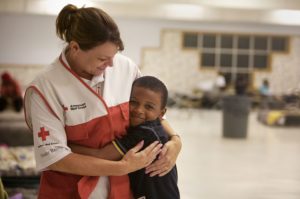 Many American Red Cross disaster volunteers credit large-scale, national disasters like 9/11 or Hurricane Katrina with initially drawing them to the organization. In the days following Hurricane Katrina, staff members and lead volunteers at the chapter where I worked as the Director of Volunteer Resources – which covered just one county in Southeastern Michigan – fielded phone calls or met in person with more than 1,400 county residents interested in volunteering. 1,400 people in one county alone.
Many American Red Cross disaster volunteers credit large-scale, national disasters like 9/11 or Hurricane Katrina with initially drawing them to the organization. In the days following Hurricane Katrina, staff members and lead volunteers at the chapter where I worked as the Director of Volunteer Resources – which covered just one county in Southeastern Michigan – fielded phone calls or met in person with more than 1,400 county residents interested in volunteering. 1,400 people in one county alone.
Like all volunteers, disaster volunteers come from all walks of life and fall into every category imaginable with regard to age, education level, ethnicity, and religion. What they share – their common bond – is the inability to look the other way when disaster strikes. Witnessing the devastation caused by natural and man-made disasters is too much for these kind and generous people to take sitting down, and so their hearts lead them to the Red Cross where they go through Volunteer Orientation, become CPR certified, and take Disaster Services Shelter Operations, Mass Care, Logistics, and Public Affairs classes.
Once trained, these volunteers can be and are contacted 24 hours a day, seven days a week, 365 days a year – including in the middle of the night – to respond in support of both those affected by disasters and first responders assisting on the scene.
Volunteers see horrific destruction and devastation, but they also see hope. And that hope keeps them coming back, time and time again. Most disaster volunteers, once they’ve completed their training and deployed – either locally or nationally – for the first time, are hooked. In all likelihood you’ll find them still volunteering for the Red Cross five, 10, 20 years after their first orientation to the organization.
There’s a strange balancing act done by disaster volunteers. The desire to help, and to use the skills learned both in disaster classes and in the field, is incredibly strong. But disaster volunteers are all too aware of the fact that in order to help and to use those skills, a disaster must strike. People’s lives must be negatively affected. No one would ever wish for disaster, but when they occur, Red Cross disaster volunteers demonstrate time and time again that they are, simply and in my humble opinion, the best of the best. They walk a tightrope – surrounded on one side by their almost-burning need to help and on the other side by people whose lives have been turned upside down – with the grace and confidence of trapeze artists who’ve been atop the rope their entire lives.
I wrote last week about how I felt when disasters struck cities I’ve called home. In the first two cases (a tornado in Iowa City, IA and flooding in Cedar Rapids, IA), it was terribly difficult to sit on the sidelines. I worked for the Red Cross – but in Ann Arbor, Michigan – when both of these disasters occurred, but as the volunteer administrator I stayed put and deployed ready, willing, and able volunteers from my chapter in Michigan to my beloved Iowa City and Cedar Rapids. I was a coach, working with a team of other coaches to strategically put players (volunteers) into the game (deployment and local support positions), but I wanted desperately to be in the game myself.
I also wrote last week about the recent tornados that severely damaged Southeast Michigan, another place I’ve called home. My desire to help, and to use the skills I’ve learned in disaster classes and the field, is incredibly strong. I would give anything to be there right now…with my coworkers, with my volunteers, with the people in my community who need my help.
I can’t be there, and the only peace I find is that which comes from knowing that the best of the best – Red Cross disaster volunteers – are there in my place.
